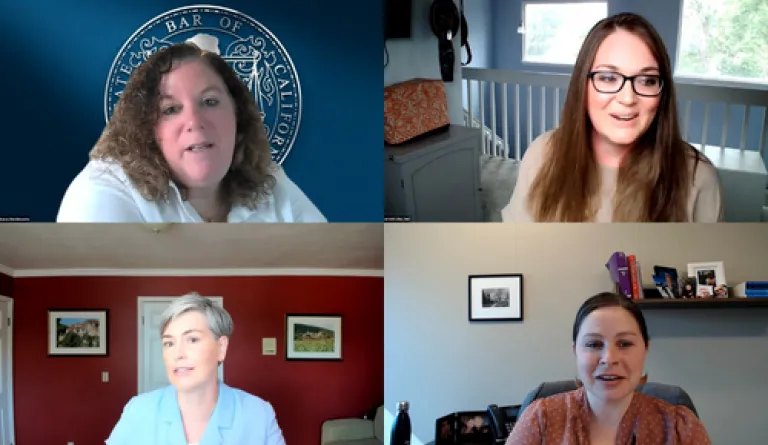IAALS Panel Explores Alternative Paths to Legal Licensure

On July 28, IAALS co-hosted the seventh session of the Redesigning Legal Speaker Series. This panel’s discussions delved into alternative lawyer licensing programs, how they differ from the current bar exam, what some jurisdictions are already testing, and how these alternatives might impact the profession. “Redesigning Legal: Redesigning How We License New Lawyers” featured a panel including:
- Logan Cornett, director of research at IAALS
- Joanna Perini-Abbot, chair of the Oregon State Bar Alternatives to the Bar Exam Task Force
- Louisa Heiny, associate dean of academic affairs at the University of Utah S.J. Quinney College of Law
The session was moderated by Donna Hershkowitz, chief of programs of the State Bar of California. Video of the event is available below, and a video with transcript is available here.
Redesigning Legal: Redesigning How We License New Lawyers from IAALS on Vimeo.
The state of California is exploring whether the uniform bar exam (UBE) is a sufficient method of testing minimum competence to practice law in its state, and if so, whether alterations should be made to the skills tested, the testing format, and/or the passing score. A second sub-committee has been assigned to explore alternatives to the traditional bar exam. Donna Hershkowitz shared some insight about how “the [Blue Ribbon Commission on the Future of the Bar Exam] has been talking about completely different test designs than what we’ve historically seen with bar exams.” The commission, she said, is currently grappling with issues regarding how to ensure minimum competency and reliability, the validity of measurement methods, and how to address the issues regarding access and equity concerns.
Logan Cornett discussed that, although the purpose of the bar exam is to ensure new law graduates possess the minimum competence required to practice law, what exactly minimum competence is has never been determined. In 2020, alongside Distinguished University Professor Emerita Deborah Merritt at The Ohio State University Moritz College of Law, IAALS published Building a Better Bar: The Twelve Building Blocks of Minimum Competence, which contains first-of-its-kind findings and recommendations to define minimum competence, as well as insights on the best ways to assess it. As Cornett remarked:
“It can be argued that not only is the bar exam not currently a valid way to assess minimum competence—it also presents a substantial barrier to entry for people of color and for people with limited financial means.
Louisa Heiny recalled how, in July 2020, the Utah Supreme Court issued the first emergency order in the United States to offer a licensing alternative via diploma privilege—a supervised practice pathway licensure—to certain eligible graduates. For law graduates who did not qualify, a traditional exam was offered at a later date. Since then, Heiny and her colleagues have drafted proposals to the supreme court and are currently working on a report that proposes a hybrid-style practice based on IAALS’ Building a Better Bar study. This practice would be made up of experience-based learning pathways, such as legal research aid and pro-bono work, and an exam similar to the Multistate Performance Test developed by the National Conference of Bar Examiners.
The Oregon State Supreme Court also adopted diploma privilege just 17 days after the state of Washington became the second state to implement the alternative practice in July 2020. Joanna Perini-Abbot noted that, during the pandemic, the Oregon State Bar Alternatives to the Bar Exam Task Force looked to states like Utah and New Hampshire as benchmark models for their alternatives to the bar exam, as well as to Canada for its supervised practices. Earlier this year, the Oregon Supreme Court unanimously approved a program similar to New Hampshire’s Daniel Webster Scholar Honors Program, which allows students to graduate without taking the traditional two-day bar exam.
Although some have called these alternative methods premature, many of the public comments regarding the alternative programs currently being explored in Utah and Oregon have been positive. Several attorneys, Heiny recalled, remarked that the bar exam did not create or test competence, but rather “was a marathon of memorization of material that they never really used in the future.”
When asked whether other states are exploring similar alternatives to Washington, Utah, and Oregon post–pandemic, Cornett noted that, whichever route they decide to go, states must be able to guarantee their licensure approach meets the five criteria for sound assessment: validity, reliability, fairness, equity, and alignment.
The session concluded with Perini-Abbot advising states interested in pursuing alternative pathways to the bar exam to build relationships with the law schools in their state. “Everything became better in our admissions process in Oregon once we started regularly meeting with our law schools. So, if you’re a state with eight or ten law schools, I suggest building that relationship between the law schools and the admissions department.” Heiny also mentioned that Utah is at its current juncture because of the strong relationships it has built with its own two law schools, and encouraged other states do the same.
We are so grateful to Logan Cornett, Joanna Perini-Abbot, and Louisa Heiny for their insights, and to Donna Hershkowitz for moderating the discussion. We hope you’ll join us for the next session in the Redesigning Legal Speaker Series, which will be held October 6.
